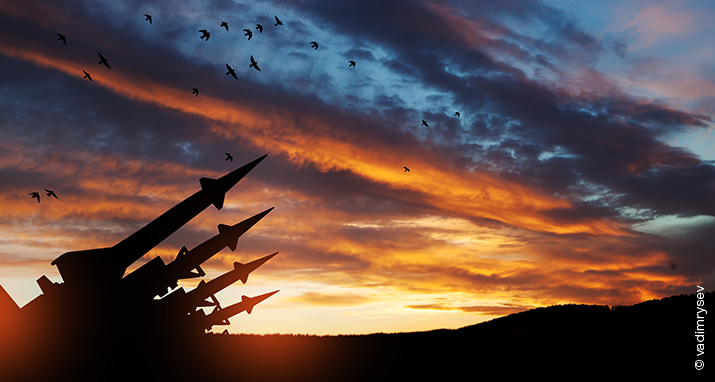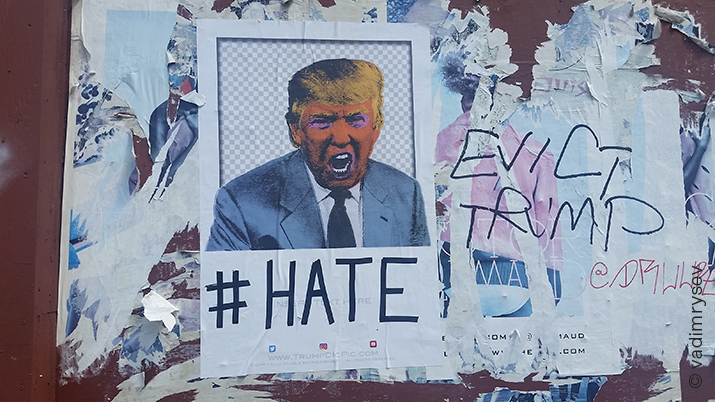Our presentation of the Centenary programme, starting with the first toll of Maria Dolens—the focus of the January editorial (issue 53 of ‘La Voce’)—has so far not allowed us to provide a summary commentary on the "events and misdeeds" of 2024, which would seem appropriate for a year that was undoubtedly extremely busy. So, with apologies to our readers for the delay, we’ll present it here.
In undertaking this analysis, we must inevitably acknowledge that a time period in which fighting (and the related massacres of civilians) continued on both the Russian/Ukrainian and Israeli/Palestinian fronts, in which the horrors of war extended to Lebanon, and in which the no-holds-barred struggle between rival military factions turned Sudan into a genuine humanitarian emergency, cannot but be labelled as "extremely problematic" by the majority of our public opinions. Add to this the circumstance that American voters chose as their 47th President the most isolationist candidate, the one least interested in international cooperation (the recent "annexationist remarks" regarding the Panama Canal, the Danish island of Greenland, and even the neighbouring G7 member Canada eloquently testify to this), and the picture is further enriched with an additional negative component.
In short, the overall context would prima facie suggest that, also due to the evident operational stalemate in which the United Nations have been for too long, the framework of agreements and multilateral conventions conceived after the Second World War and which remained in relatively good health until the end of the last century, has now entered an irreversible crisis. It is being replaced, almost everywhere, as the general norm of conduct between states, by the law of the strongest (the so-called ‘might makes right’).
However, a less biased and more balanced reflection of today's world situation seems destined to lead to conclusions that are, fortunately, less pessimistic. In issue 47 of 'La Voce' we have already mentioned how the year just ended was marked by a record number of elections on five continents, involving no less than 76 countries and two billion voters. In many of these - including some components of the Global South, i.e. the geographical area most prone, according to political scientists, to prefer authoritarian and illiberal regimes - the appointments at the ballot box were comforting for the opposition forces.
Two examples relating to two major players on the international scene, as founders of the BRICS and influential members of the G20, are worth mentioning. These are India and South Africa, where the parties that have been in power for several years (in the case of Pretoria, without interruption since the end of apartheid) have been forced, in order to stay in power, to reach coalition agreements with reformist forces and accept compromises in their programmes.
On closer inspection, the observation of the present Russian context also contributes to a review of the leap year, 'in a substantial draw', to use a football metaphor. While Putin's control over his country remains full and uncontested to this day, it is ‘state authoritarianism’ that may, in the future, be exposed—upon objective analysis—to cracks of considerable significance. The modest military successes reported by the 'tsar's' army in the Donbass and the Kursk region are indeed exacting a heavy price, and not only because of losses on the ground on a scale far greater than the Kremlin admits. On a general level, the perverse effects of the prolonged diversion of substantial percentages of Gross Domestic Product, in favor of the war effort, are being felt. This diversion is essential for a more balanced economic development of the country. Significant declines in industrial and agricultural production, high inflation rates, and increasing dependence on the Chinese market for the allocation of its raw materials, particularly hydrocarbons, are just some of the inevitable consequences linked to a strategic choice that, in the long run, will prove detrimental to the interests of the Russian Federation.
In addition to these structural deficits, there is the considerable squandering of resources associated with the futile goal of preserving the leadership of its "protégé," Bashar al-Assad, in Damascus. The latter's ruinous fall last December was a heavy defeat for Putin, both politically and in terms of image, shared with the other unconditional supporter of the fierce Alawite dictator, Iran, in turn reduced in size by the Israeli army's heavy blows to the Hamas and Hezbollah movements, both notoriously close to Tehran.
In a rapidly evolving overall scenario, the uncertainty surrounding China's future role and influence on the global stage is undoubtedly still an issue. On the international relations front, Beijing does not shy away from behaviours that could be described as "provocative" (such as airspace incursions and naval exercises) towards neighbouring countries in the region, (especially the Philippines). Not to mention the repeated statements from its political leadership in support of the expected return of the "rebellious island," Taiwan, to the fold of One China. Without underestimating the relevance of the dense network of relations woven, also thanks to the Belt and Road Initiative, with various Asian and African countries, the Chinese economy, the country's real strength over the past decades, is going through an obvious phase of slowdown. According to experts in the field, rather than being linked to periodic cycles, which cannot be directly attributed to specific policy lines, the decline in performance should primarily be traced back to Xi Jinping's desire to place the economic system of the People's Republic under the control of the Communist Party, thereby preventing the free market from expressing its full dynamism.
In conclusion, despite the continued presence of large areas of uncertainty over the two major ongoing conflicts (in the Israeli/Palestinian conflict, we note with great satisfaction the achievement of a shared ceasefire, and hope that it will be observed by the parties involved) and situations of high unpredictability (primarily in Syria), 2024 appears to have nonetheless confirmed the resilience of democratic systems and their ability to adapt to rapidly changing scenarios.
Applying the electoral discourse mentioned earlier to the European continent, it must be acknowledged that Great Britain successfully navigated the transition from the Conservatives (who had been in power for 14 years) to the Labour Party without excessive trauma. While France was more shaken by its closely spaced elections (which could see a new aftermath in 2025, a year that is also important for Germany, which is called to early elections in February), its population nonetheless clearly expressed dissatisfaction with the actions of the sitting president and government. This positive assessment should be extended to Spain, which has been able to rack up a series of economic results in recent years, starting from a less than privileged position. These have propelled it to first place in the special ranking of industrialised countries in terms of aggregate growth indices.
Indeed, the ability to distance oneself from unpopular leaders, shelve outdated projects, and quickly pivot towards addressing the priorities of the moment seems to be the key factor that enables democracies in general (and the European ones in particular) to keep pace with the rise of new international actors and potential competitors in various geographical contexts. It has been historically proven that conflicts mainly arise in situations of power vacuums, which need to be filled. All the more reason for democracies to believe firmly in their principles and values and to demonstrate a heightened commitment to growth, cohesion, and stability.
Reggente Marco Marsilli, Foundation President










